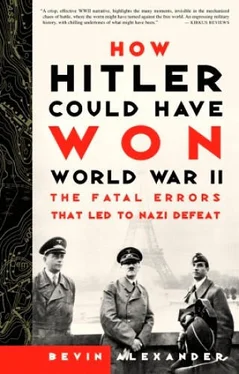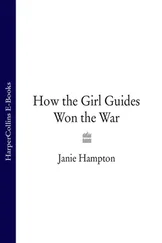The British fell back into Arras and attempted no further attack.
The Allied effort had been too weak to alter the situation, but showed what could have been done if the Allied commanders had mobilized a major counterattack. Even so, the British effort had wide repercussions. Rommel’s division lost 387 men, four times the number suffered until that point. The attack also stunned Rundstedt, and his anxiety fed Hitler’s similar fears and led to momentous consequences in a few days.
On May 22, Guderian wheeled north from Abbéville and the sea, aiming at the channel ports and the rear of the British, French, and Belgian armies, which were still facing eastward against Bock’s Army Group B. Reinhardt’s panzers kept pace on the northeast. The next day, Guderian’s tanks isolated Boulogne, and on May 23, Calais. This brought Guderian to Gravelines, barely ten miles from Dunkirk, the last port from which the Allies in Belgium could evacuate.
Reinhardt also arrived twenty miles from Dunkirk on the Aa (or Bassée) Canal, which ran westward past Douai, La Bassée, and St. Omer to Gravelines. The panzers were now nearer Dunkirk than most of the Allies.
While the right flank of the BEF withdrew to La Bassée on May 23 under pressure of a thrust northward by Rommel from Arras toward Lille, the bulk of the British forces moved farther north to reinforce the line in Belgium. Here Bock’s forces were exerting increasing pressure, causing King Leopold to surrender the Belgian army the next day.
Despite this, Rundstedt gave Hitler a gloomy report on the morning of May 24, laying emphasis on the tanks the Germans had lost and the possibility of meeting further Allied attacks from the north and south. All this reinforced Hitler’s own anxieties. He showed his paranoia by saying he feared the panzers would get bogged down in the marshes of Flanders, though every tank commander knew how to avoid wet areas.
Hitler had been extremely nervous from the start of the breakthrough. Indeed, he became more nervous the more success the Germans gained, worrying about the lack of resistance and fearing a devastating attack on the southern flank. He had not grasped that Manstein’s strategy and Guderian’s brilliant exploitation were bringing about the most overwhelming decision in modern military history. The Germans had been out of danger from the first day, but to Hitler (and to most of the senior German generals) it seemed too good to be true.
The question now arose of what to do about the British and French armies in Belgium. With virtually no enemy forces in front of them, Guderian and Reinhardt were about to seize Dunkirk and close off the last possible port from which the enemy troops could embark. This would force the capitulation of the entire BEF and the French First Group of Armies, more than 400,000 men.
At this moment, the war took a bizarre and utterly bewildering turn. Why events unrolled as they did has been disputed ever since, and no one has come close to understanding the reasons.
Hitler called in Walther von Brauchitsch, the army commander in chief, and ordered him to halt the panzers along the line of the Bassée Canal. Rundstedt protested, but received only the curt telegram: “The armored divisions are to remain at medium artillery range from Dunkirk [eight or nine miles]. Permission is only granted for reconnaissance and protective movements.”
Kleist thought the order made no sense, and he pushed his tanks across the canal with the intention of cutting off the Allied retreat. But he received emphatic orders to withdraw behind the canal. There the panzers stayed for three days, while the BEF and remnants of the 1st and 7th French Armies streamed back to Dunkirk. There they built a strong defensive position, while the British hastily improvised a sea lift.
The British used every vessel they could find, 860 in all, many of them civilian yachts, ferryboats, and small coasters. The troops had to leave all their heavy equipment on shore, but between May 26 and June 4 the vessels evacuated to England 338,000 troops, including 120,000 French. Only a few thousand members of the French rear guard were captured.
Two seemingly plausible reasons have been advanced for Hitler’s decision. One is that Hermann Göring, one of his closest associates and chief of the Luftwaffe, promised that he could easily prevent evacuation with his aircraft, since the panzers were needed to turn south and begin the final campaign to defeat France. The other is that Hitler wanted a settlement with Britain and deliberately prevented the destruction of the BEF to make peace easier to attain. Regardless of which motivations impelled Hitler, he made the wrong judgment. The Luftwaffe did a poor job, and the British were uplifted by the “miracle of Dunkirk,” redoubling their resolve to fight on.
The Luftwaffe started late, not mounting a strong attack until May 29. Air attacks increased over the next three days, and on June 2 daylight evacuation had to be suspended. But RAF fighters valiantly tried to stop the bombing and strafing runs, and were in part successful. The beach sand absorbed much of the blast effects of bombs. The Luftwaffe did most of its damage at sea, sinking 6 British destroyers, 8 transport ships, and more than 200 small craft.
Hitler lifted the halt order on May 26, but soon thereafter army headquarters directed the panzers to move south for the attack across the Somme, leaving to Army Group B’s infantry the task of occupying Dunkirk—after the Allies had gone.
On June 4, Winston Churchill rose to speak in the House of Commons. He closed his address with these words that inspired the world:
We shall go on to the end, we shall fight in France, we shall fight in the seas and oceans, we shall fight with growing confidence and growing strength in the air, we shall defend our island, whatever the cost may be, we shall fight on the beaches, we shall fight on the landing-grounds, we shall fight in the fields and in the streets, we shall fight in the hills; we shall never surrender, and even if, which I do not for a moment believe, this island or a large part of it were subjugated and starving, then our empire beyond the seas, armed and guarded by the British fleet, would carry on the struggle, until, in God’s good time, the New World, with all its power and might, steps forth to the rescue and the liberation of the Old.
The end in France came swiftly. In three weeks, the Germans had captured more than a million prisoners, while suffering 60,000 casualties. The Belgian and Dutch armies had been eliminated, and the French had lost thirty divisions, nearly a third of their total strength, and this the best and most mobile part. They had also lost the assistance of eight British divisions, now back in Britain, with most of their equipment lost. Only one British division remained in France south of the Somme.
Weygand was left with sixty-six divisions, most of them understrength, to hold a front along the Somme, the Aisne, and the Maginot Line that was longer than the original. He committed forty-nine divisions to hold the rivers, leaving seventeen to defend the Maginot Line. Most of the mechanized divisions had been lost or badly shattered. However, the Germans quickly brought their ten panzer divisions back to strength and deployed 130 infantry divisions, only a few of which had been engaged.
The German high command reorganized its fast troops, combining armored divisions and motorized divisions in a new type of panzer corps, generally with one motorized and two armored divisions to each corps.
OKH promoted Guderian to command a new panzer group of two panzer corps, and ordered him to drive from Rethel on the Aisne to the Swiss frontier. Kleist kept two panzer corps to strike south from bridgeheads over the Somme at Amiens and Péronne, but these later shifted eastward to reinforce Guderian’s drive. The remaining armored corps, under Hoth, was to advance between Amiens and the sea.
Читать дальше


![Джонатан Димблби - Barbarossa - How Hitler Lost the War [calibre]](/books/385421/dzhonatan-dimblbi-barbarossa-how-hitler-lost-the-w-thumb.webp)









